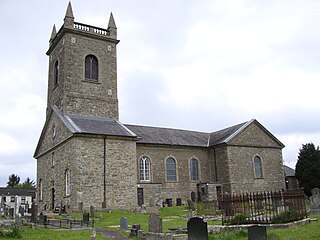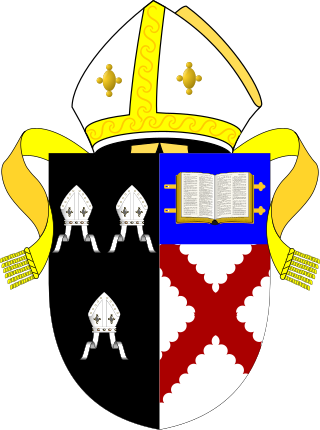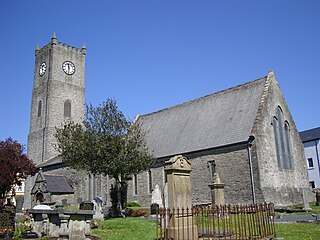The Bishop of Lismore was a separate episcopal title which took its name after the town of Lismore in County Waterford, Republic of Ireland.
The diocese of Lismore was one of the twenty-four dioceses established by the Synod of Rathbreasail in 1111. The see of Ardmore was incorporated with Lismore in the late 12th century. In 1363, Lismore and Waterford were united by Pope Urban V, and Thomas le Reve became the first bishop of the united see of Waterford and Lismore. [1] [2] [3]
| Bishops of Lismore | |||
|---|---|---|---|
| From | Until | Incumbent | Notes |
| unknown | 1113 | Niall mac Meic Áedacáin | Died in office |
| unknown | 1119 | Ua Daighthig | Died in office |
| unknown | 1135 | Máel Ísu Ua hAinmere, O.S.B. | Probably was bishop of Lismore and Waterford during the last years of his life; died in office; also known as Malchus |
| 1135 | c.1151 | Máel Muire Ua Loingsig | Probably resigned circa 1151; his death is recorded in the Annals of Ulster in 1159 |
| 1151 | c.1179 | Gilla Críst Ua Connairche, O.Cist. | Consecrated in 1151; resigned circa 1179; died 1186; first Abbot of Mellifont; he is said to have been the first papal legate in Ireland; also known as Christianus |
| c.1179 | 1202 | Felix | Elected circa 1179; attended the Third Council of the Lateran in 1179; resigned 1202 |
| 1203 | bef.1216 | Malachias, O.Cist. | Elected circa 1202 and consecrated before 5 November 1203; died before 1216 |
| 1216 | 1218 | Thomas | Elected and consecrated before June 1216; died before December 1218 |
| 1218 | 1223 | Robert of Bedford | Formerly Bishop-elect of Glendalough; elected Bishop of Lismore before 13 December 1218 and received possession of the temporalities on that date; consecrated before 17 April 1219; died before November 1223 |
| 1228 | 1246 | Griffin Christopher | Elected before 6 November 1223 and received possession of the temporalities on that date; received the temporalities again from the king on 8 July 1225 and again 11 July 1227; consecrated before 25 April 1228; resigned sometime between 17 July and 8 August 1246; died after 22 August 1252 |
| 1246/48 | 1253 | Ailinn Ó Súilleabáin, O.P. | Translated from Cloyne after 26 October 1246, but did receive possession of the see's temporalities until 25 May 1248; died before 27 April 1253; also known as Alan O'Sullivan |
| 1253 | 1270 | Thomas | Elected before 25 July 1253; received possession of the temporalities after 27 July 1253; consecrated after 15 October 1253; died before 2 July 1270 |
| 1270 | 1279 | John Roche | Elected before 20 August 1270 and received possession of the temporalities after that date; died 11 June 1279; also known as John de Rupe |
| 1280 | 1308 | Richard Corre | Elected 19 July and consecrated after 24 October 1279; received possession of the temporalities 11 November 1279; died in October 1308 |
| 1309 | 1321 | William Fleming | Elected after 24 November 1308; died in November 1321; also known as William le Fleming |
| 1321 | 1354 | John Leynagh | Elected after 13 December 1321 and consecrated 17 April 1323; died in December 1354; also known as John Launaught |
| 1354 | 1358 | See vacant | During this vacancy, King Edward III ordered the temporalities of Lismore to be delivered to Roger Cradock, Bishop of Waterford, however, this was not done. |
| 1358 | 1363 | Thomas le Reve | Appointed 18 May 1358 and received possession of the temporalities 24 August 1358; became Bishop of Waterford and Lismore on 16 June 1363 when Pope Urban V united the two dioceses |
| In 1363, Lismore united with Waterford to form the united bishopric of Waterford and Lismore | |||
| Source(s): [1] [2] [3] | |||

The Bishop of Clogher is an episcopal title which takes its name after the village of Clogher in County Tyrone, Northern Ireland. Following the Reformation, there are now parallel apostolic successions: one of the Church of Ireland and the other of the Roman Catholic Church.
The Archbishop of Cashel was an archiepiscopal title which took its name after the town of Cashel, County Tipperary in Ireland. Following the Reformation, there had been parallel apostolic successions to the title: one in the Catholic Church and the other in the Church of Ireland. The archbishop of each denomination also held the title of Bishop of Emly. In the Catholic Church, it was superseded by the role of Archbishop of Cashel and Emly when the two dioceses were united in 2015 and in the Church of Ireland the title was downgraded to a bishopric in 1838.

The Bishop of Ardagh was a separate episcopal title which took its name after the village of Ardagh, County Longford in the Republic of Ireland. It was used by the Roman Catholic Church until 1756, and intermittently by the Church of Ireland until 1839.

The United Dioceses of Meath and Kildare is a diocese in the Church of Ireland located in the Republic of Ireland. The diocese is in the ecclesiastical province of Dublin. Alone of English and Irish bishops who are not also archbishops, the Bishop of Meath and Kildare is styled "The Most Reverend".

The Bishop of Kildare and Leighlin is the ordinary of the Roman Catholic Diocese of Kildare and Leighlin, one of the suffragan dioceses of the Archdiocese of Dublin. The episcopal title takes its name from the towns of Kildare and Old Leighlin in the province of Leinster, Ireland.

The Bishop of Kildare was an episcopal title which took its name after the town of Kildare in County Kildare, Ireland. The title is no longer in use by any of the main Christian churches having been united with other bishoprics. In the Roman Catholic Church, the title has been merged with that of the bishopric of Leighlin and is currently held by the Bishop of Kildare and Leighlin. In the Church of Ireland, the title has been merged with that of the bishopric of Meath and is currently held by the Bishop of Meath and Kildare.
The Bishop of Waterford was a medieval prelate, governing the Diocese of Waterford from its creation in the 11th century until it was absorbed into the new Roman Catholic Diocese of Waterford and Lismore in the 14th century. After the creation of four archdioceses for Ireland in the middle of the 12th century, Waterford fell under the Archbishop of Cashel.
The Bishop of Waterford and Lismore is an episcopal title which takes its name after the city of Waterford and town of Lismore in Ireland. The title was used by the Church of Ireland until 1838, and is still used by the Roman Catholic Church.

The Bishop of Raphoe is an episcopal title which takes its name after the town of Raphoe in County Donegal, Ireland. In the Roman Catholic Church it remains a separate title, but in the Church of Ireland it has been united with another bishopric.
The Bishop of Cashel and Ossory is the Ordinary of the United Diocese of Cashel, Waterford and Lismore with Ossory, Ferns and Leighlin in the Church of Ireland. The diocese is in the ecclesiastical province of Dublin.
The Bishop of Cashel and Waterford was the Ordinary of the Church of Ireland diocese of Cashel and Waterford; comprising all of County Waterford, the southern part of County Tipperary and a small part of County Limerick, Ireland.
The Bishop of Emly was a separate episcopal title which took its name after the village of Emly in County Tipperary, Republic of Ireland. In both the Catholic Church and the Church of Ireland, it has been united with other sees.
The Lord Bishop of Leighlin was a separate episcopal title which took its name after the small town of Old Leighlin in County Carlow, Ireland.

The United Dioceses of Cashel and Ossory is a diocese of the Church of Ireland in the south-eastern part of Ireland that was formed from a merger of older dioceses in 1977. The diocese is in the ecclesiastical province of Dublin.
William Cecil de Pauley was a Church of Ireland bishop and author in the 20th century.
Hugh Gore DD (1613-1691) was a seventeenth century Anglican Bishop of Waterford and Lismore in Ireland who founded Swansea Grammar School.
George Baker was Bishop of Waterford and Lismore in the Church of Ireland from 1661 until 1665.
Patrick Walsh was an Irish prelate who served as the Bishop of Waterford and Lismore from 1551 to 1578.
Thomas Wetherhead was Archdeacon of Cork and of Cloyne then Bishop of Waterford and Lismore from 1589 until 1592.
John Lancaster was a seventeenth century Anglican Bishop of Waterford and Lismore in Ireland.